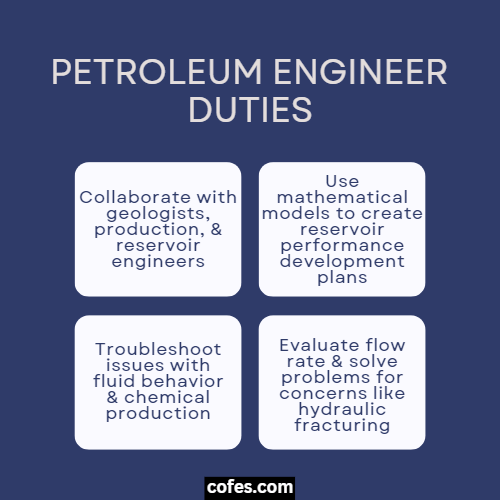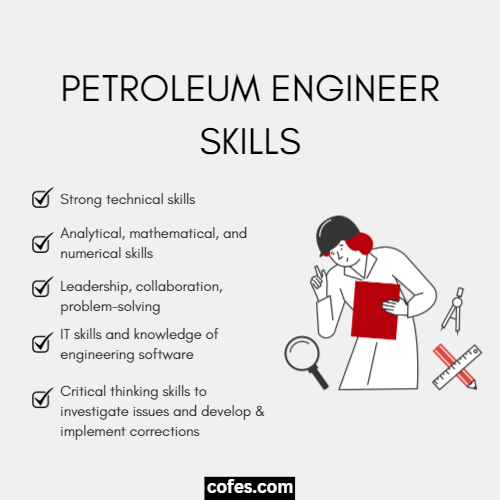Oil and gas engineering encompasses everything from field exploration and production to computer modeling and predictions of future output performance.
Exploration and extraction of petroleum are strongly tied to geoscience, which aids petroleum engineers in understanding the geological structures and conditions conducive to oil deposit formation.
It’s a petroleum engineer’s job to extract gaseous and liquid hydrocarbon products from the earth while also handling all of the economic and regulatory issues associated with drilling, production, processing, and transportation.
So, read below to find out all you need to know about petroleum engineers.
Petroleum Engineer Information
| OFFICIAL JOB TITLE | PETROLEUM ENGINEER |
| AVERAGE SALARY | $130,850 |
| STRESS LEVEL | AVERAGE |
| WORK/LIFE | AVERAGE |
| JOB SATISFACTION | HIGH |
| CAREER ADVANCEMENT | HIGH |
Petroleum Engineer Job Description
What is a Petroleum Engineer?
The work of a petroleum engineer encompasses practically every aspect of the oil and gas industry’s life cycle, from exploration to production.
To find hydrocarbons, they want to use the least energy possible while also resolving any operational challenges.
Using innovative drilling tools and techniques and getting the most out of underperforming or older wells are also responsibilities of petroleum engineers.
Petroleum engineers are accountable for ensuring that drilling has the least negative impact on the environment as humanly possible.
What Does A Petroleum Engineer Do Daily?
As a petroleum engineer, you design equipment, develop drilling and recovery physical plans, operate computer-controlled drilling or fracturing machinery, and do many other duties.
Developing oil and gas reserves may take you around the world as a petroleum engineer.

Responsibilities, Duties & Roles Of A Petroleum Engineer
- Collaboration between geologists, production and reservoir engineers, and commercial managers to interpret well-logging results and predict production capacity
- Putting together comprehensive reservoir performance development plans based on mathematical models
- Determining the best tubing size and installing the most appropriate well equipment for the job
- Design of the well’s completion – the part that connects to the reservoir’s rock and fluids
- Planning and implementing systems to make a well more efficient, such as submersible pumps
- Troubleshooting issues with fluid behavior and chemical production
- Performing flow rate evaluations and making recommendations for methods like hydraulic fracturing (which forces fluid into a well to fracture the rock) and acid treatment, for example (to erode the rock and improve flow path)
- Controlling and managing wells with a spout at the base (horizontal and multilateral wells)
- Making engineering decisions based on reservoir value management via remote sensing and surveillance data collected from wells and reservoirs
- Managing the relationships between contractors and health, safety, and environmental performance requires understanding and managing how a group of wells interacts.
Petroleum Engineer Salary
Average Salary
An average Petroleum Engineer has average yearly pay of $130,850.
Starting Salary
The average salary for an entry-level Petroleum Engineer is $77,546.
Senior Salary
A Senior Petroleum Engineer has a yearly pay of $171,999.
How To Become A Petroleum Engineer
The Entry Level: Certification, Training & Degree
A bachelor’s degree in engineering, particularly petroleum engineering, is required for petroleum engineers.
On the other hand, a bachelor’s degree in engineering may meet employer requirements.
College cooperative education programs, where students earn academic credit while gaining real-world work experience, are highly valued by employers.
A bachelor’s degree is required for entry-level positions in petroleum engineering.
In engineering and related fields such as geology and thermodynamics, bachelor’s degree programs incorporate lectures, laboratory practice, and fieldwork.
Students can obtain practical experience while finishing their education in most schools and institutions that offer cooperative programs.
Students who complete 5-year chemical or mechanical engineering programs will earn both a bachelor’s and an advanced degree when they graduate.
Graduate degree holders may find it easier to land a job.
Engineers with advanced degrees can also work as professors at select colleges or in R&D.
Entry-level petroleum engineer jobs do not necessitate a license.
Later in one’s career, one can earn a Professional Engineer (PE) license, which gives them more authority and autonomy.
Professional engineers refer to engineers who hold a license and are members of the engineering profession (PEs).
PEs have the power to supervise the work of other engineers, sign off on projects, and offer direct services to the general public as well.

Other Skill Sets, Requirements & Qualifications
- Analytical skills: As a result, petroleum engineers must compile and make sense of enormous amounts of technical data.
- Creativity. Engineers in the petroleum industry must develop innovative solutions for extracting oil and gas because every drill site is different.
- Personality traits. Petroleum engineers must collaborate with other professionals on projects that require sophisticated technology, equipment, and infrastructure. Engineers and oil and gas employees must communicate and cooperate effectively if projects meet client expectations and run well.
- Math skills: Oil and gas engineers employ calculus and other complex mathematical ideas in their work for analysis, design, and troubleshooting.
- Problem-solving skills: For petroleum engineers, identify potential drilling plan problems since these can be extremely expensive to resolve. When problems arise, petroleum engineers must be on the lookout for them while also promptly fixing them.
How Does It Take To Become A Petroleum Engineer?
Normally, it takes four years to complete a bachelor’s degree in petroleum engineering or engineering in general.
The first two years will lay a solid foundation.
The final two years will cover a wide range of geological courses to help students better understand rock formations.
Is it hard To Become A Petroleum Engineer?
The field of engineering is a challenging one in general.
To graduate, you’ll need to put in the time and effort.
The prerequisites are usually high, which means you must excel in high school to get an engineering degree at a university.
The first two years are a lot like each other for all engineers, assuming you get accepted to university.
If you have trouble with math and physics, many calculus classes can be difficult for you.
Even those who did well in math in high school may have difficulty with it in college.
Many first-year engineering students fail, and as a result, they decide to change their majors to something different.
Petroleum Engineer Career Paths
The Petroleum Engineer Roadmap
- Education:
- Some engineering-focused colleges offer drilling and other activities as a hands-on experience/practice.
- These will prepare you for the work you’ll be doing when you get there.
- The typical length of a petroleum engineering program is five years.
- On the other hand, the fifth year is when you’ll be working on various practical projects.
- You can advance your education in the field after earning a bachelor’s degree by pursuing a graduate degree.
- This opens doors for you in oil businesses as a manager, even if you lack the formal education required for such a position.
- You will be eligible for the greatest positions if you have work experience and a graduate degree.
- Certification:
- Although your educational background should land you a good job, earning a professional certification isn’t a bad idea either.
- This enhances your credibility as a Petroleum Engineer even further.
- The Professional Engineering Exam (PE) should be sufficient if you get a passing score on it.
Projections For Growth In Petroleum Engineer Jobs
About the Bureau of Labour Statistics (BLS), employment of petroleum engineers is expected to increase by 8% through 2031.
It seems likely that oil prices will have a significant impact on job growth in the future.
Because many petroleum engineers work in the oil and gas extraction industry, oil prices will probably impact the people employed.
An increase in the price of oil and gas may increase the amount of money invested in new facilities and the expansion of existing ones.
When oil and gas prices are high, corporations often increase their efforts to find new deposits.
Is Petroleum Engineer A Good Career?
Petroleum Engineering is ranked third among the best engineering jobs based on job satisfaction.
In terms of growth, it’s a good career choice because there will likely be a need for these engineers far into the future.
Working Conditions
Can A Petroleum Engineer Work Remotely From Home?
Petroleum engineers spend almost all of their time in offices or on drilling and well sites.
Frequent travel is essential to visit these sites or meet with other engineers, oilfield workers, and consumers.
How Many Hours Does A Petroleum Engineer Work?
Working hours are typically 9 a.m. to 5 p.m., but occasional overtime is common.
Major corporations frequently provide flexible work schedules.
Offshore missions necessitate shift work for two weeks, with 12 hours on and 12 hours off in between, followed by a two- to three-week onshore holiday.
Can A Petroleum Engineer Work Part-Time?
The majority of petroleum engineers work full-time.
What Are The Average Vacation Days Of A Petroleum Engineer?
Vacations for drafters are usually 14-30 days long during the busiest seasons of the year.
Alternative Careers & Similar Jobs to a Petroleum Engineer
- Computer Engineer
- Safety Engineer
- Sound Engineer
- Product Engineer
- Electrical Engineer
- DevOps Engineer
- AI Engineer
- Sales Engineer
- Engineering Technician
- Maintenance Engineer
- Nuclear Engineer
Petroleum Engineer Resume Tips
Be sure to include relevant professional experience and skills on your Petroleum Engineer Resume, tailored to the position you’re looking for.
Whatever your career stage, highlighting significant achievements on your resume will help you stand out and land that all-important job interview.
Petroleum Engineer Interview Questions
- What are the well-test analysis procedures that you’ve used?
- Why do pressure drawdown tests have such a big advantage?
- What do you mean by “well logging,” exactly?
- What do you understand by “bull heading”?
- Which mineral is commonly used to make drilling mud heavier or denser?
- What does hydraulic fracturing mean, exactly?
Job-Related To Petroleum Engineer
- Architectural and Engineering Managers
- Geoscientists
- Industrial Engineers
- Mechanical Engineers
- Civil Engineers
- Chemical Engineers
- Mining and Geological Engineers
- Geological and Hydrologic Technicians
Tips For Hiring A Petroleum Engineer
Key Characteristics To Look For In A Petroleum Engineer
1. Speed up your hiring procedure
Processes that are more than a decade old make hiring more difficult and time-consuming.
In the petroleum engineering field, recruiting delays affect drilling at new and current sites, which can slow output and impact your bottom line.
If so, make the necessary changes to improve your hiring process’s efficiency.
2. Develop a competitive compensation package
It’s expensive to hire top-notch petroleum engineers.
They are in high demand among oil and gas corporations around the country because of their laser-specific talents, which cover every area of oil and gas production.
Offering a pay package that matches or exceeds the competition can help you get the top prospects.
3. Identify the top skills of petroleum engineers
Your job posting will need to be as specific as possible to attract candidates who best match your company’s requirements because petroleum engineers have diverse areas of competence depending on their experience and training.
4. Create a job description that grabs the reader’s attention
Successful job descriptions pique the interest of and maintain the loyalty of their target audience.
5. Refresh your knowledge of current business trends.
Before starting any hiring process, make sure you’ve done your research and know what’s going on in the industry.
This will help you make better selections today and provide you with a better idea of your hiring needs in the future.
6. Select the sources you’ll use to locate potential employees
There are many ways to find your company’s next big star, from job boards to industry conventions and everything in between.
However, not all options compare well regarding the kind of candidates they will produce – something to bear in mind when employing petroleum engineers responsible for high-value, extremely complex projects that generate income.
